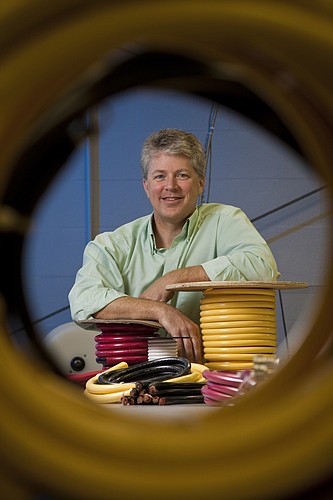- April 9, 2025
-
-
Loading

Loading

Being boring pays in John Swiatkowski's business.
That business is manufacturing wire and cable for a multitude of machines and vehicles, from boats to golf carts to industrial floor sweepers. “It's not very exciting,” admits Swiatkowski, president of the Sarasota-based company, Pacer Group.
What is stimulating, however, is the fact that Pacer has made a stellar comeback from the recession. To wit: Annual revenues increased 52% in 2011, from $14.5 million in 2010 to $22 million last year. The firm is now up 120% since 2009, when it had $10 million in sales. The company has 110 employees.
Pacer, which focused primarily on products for the marine and boating industry from 1978-2008, hasn't made it back to pre-recession sales and employee levels — though it's close. The business peaked in 2006, when it had about 120 employees and $28 million in annual sales.
One turnaround key has been the company's all-out effort to find new business lines. Swiatkowski believed branching out would be a survival priority, given the boating industry shrank by at least two-thirds in the downturn.
“We diversified away from marine,” says Swiatkowski. “When people have money they buy boats; when they don't have money, they don't.”
Swiatkowski says the company's diversification strategy focused on new work and services it could offer existing clients. That includes doing more installation on products it already sells, for instance. The firm also assembles more products in-house, so it can expand its margins.
Two new business units, moreover, are batteries and e-commerce. On batteries, Swiatkowski says the fact that there are more gadgets out there than ever before means there is a need for more energy. So the company now makes tiny wires battery manufacturers use. Says Swiatkowski: “That business has a tremendous potential for growth.”
Even with diversification, Pacer still does a lot of work the marine industry, where it has clients worldwide, from Sarasota-Bradenton to the Middle East. The company has two other facilities, in addition to its 42,000-square-foot headquarters just east of Interstate 75 in Sarasota. It has a 40,000-square-foot plant in Wauchula, Hardee County, and it also has an office in Fort Lauderdale, where Swiatkowski's father, Joseph Swiatkowski, founded the firm.
The younger Swiatkowski, meanwhile, projects the firm will grow revenues by at least 20% in 2012, mostly from the recent diversification shift.
Nonetheless, the business isn't without its challenges.
For one, wires and cables are essentially commodities, which means the industry is hyper-competitive. Swiatkowski says he constantly seeks an edge in competition against manufacturers from China and Mexico. He finds that edge, usually, in smaller, yet more complicated projects for other domestic manufacturers.
Another challenge is instability in buying materials like copper. Swiatkowski says the price of copper and other materials tends to increase whenever the Federal Reserve shifts monetary policy to stimulate the economy, such as quantitative easing. That makes running the business more unpredictable, he says.
Swiatkowski at least feels better that the economy is on the mend. Says Swiatkowski: “We are reasonably optimistic that if we get into a slowdown, it will be a short one.”
Video: Amanda Heisey